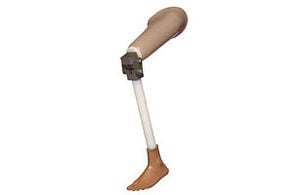
Problem being addressed[edit | edit source]
There are tens of thousands of amputees living in the developing world. Unfortunately, patients that live in these resource-poor areas and who lose a knee joint have few options. A titanium replacement can cost up to $10,000 and other inexpensive models are too crude to work effectively.
Detailed description of the solution[edit | edit source]
The JaipurKnee is flexible and stable, even on irregular terrain. It is comprised of five pieces of plastic, four nuts and bolts and has self-lubricating, oil-filled nylon. It does not require special tools and only takes a few hours to manufacture.
Designed by[edit | edit source]
- Designed by: Joel Sadler and team of classmates from a design course at Stanford University.
When and where it was tested/implemented[edit | edit source]
The device costs $20 USD and is more effective than other crude models. It works effectively on rough terrain. It is currently being tested in India with a projected 100,000 devices being distributed in the next three years.
References[edit | edit source]
Internally generated reports[edit | edit source]
Stober, D. (2009, April 15). Cool product: $20 artificial knee for patients in the developing world. Stanford News Service: (650) 721-6965. Link available here.
Externally generated reports[edit | edit source]
Abend L, Altman A, et al. The 50 Best Inventions of 2009. Time. Link available here.